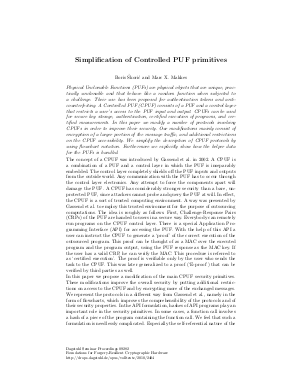Simplification of Controlled PUF primitives
Authors Boris Skoric, Marc X. Makkes
-
Part of:
Volume:
Dagstuhl Seminar Proceedings, Volume 9282
Part of: Series: Dagstuhl Seminar Proceedings (DagSemProc) - License:
 Creative Commons Attribution 4.0 International license
Creative Commons Attribution 4.0 International license
- Publication Date: 2010-01-13
File

PDF
DagSemProc.09282.7.pdf
- Filesize: 173 kB
- 2 pages
Document Identifiers
Subject Classification
Keywords
- PUF
- physical unclonable function
- controlled PUF
- CPUF
Metrics
- Access Statistics
-
Total Accesses (updated on a weekly basis)
0Document
0Metadata
Abstract
Physical Unclonable Functions (PUFs) are physical objects that are unique, practically unclonable and that behave like a random function when subjected to a challenge. Their use has been proposed for authentication tokens and anti-counterfeiting. A Controlled PUF (CPUF) consists of a PUF and a control layer that restricts a user's access to the PUF input and output. CPUFs can be used for secure key storage, authentication, certified execution of programs, and certified measurements. In this paper we modify a number of protocols involving CPUFs in order to improve their security. Our modifications mainly consist of encryption of a larger portion of the message traffic, and additional restrictions on the CPUF accessibility. We simplify the description of CPUF protocols by using flowchart notation. Furthermore we explicitly show how the helper data for the PUFs is handled.
Cite As Get BibTex
Boris Skoric and Marc X. Makkes. Simplification of Controlled PUF primitives. In Foundations for Forgery-Resilient Cryptographic Hardware. Dagstuhl Seminar Proceedings, Volume 9282, Schloss Dagstuhl – Leibniz-Zentrum für Informatik (2010)
https://doi.org/10.4230/DagSemProc.09282.7
BibTex
@InProceedings{skoric_et_al:DagSemProc.09282.7,
author = {Skoric, Boris and Makkes, Marc X.},
title = {{Simplification of Controlled PUF primitives}},
booktitle = {Foundations for Forgery-Resilient Cryptographic Hardware},
series = {Dagstuhl Seminar Proceedings (DagSemProc)},
ISSN = {1862-4405},
year = {2010},
volume = {9282},
editor = {Jorge Guajardo and Bart Preneel and Ahmad-Reza Sadeghi and Pim Tuyls},
publisher = {Schloss Dagstuhl -- Leibniz-Zentrum f{\"u}r Informatik},
address = {Dagstuhl, Germany},
URL = {https://drops.dagstuhl.de/entities/document/10.4230/DagSemProc.09282.7},
URN = {urn:nbn:de:0030-drops-24044},
doi = {10.4230/DagSemProc.09282.7},
annote = {Keywords: PUF, physical unclonable function, controlled PUF, CPUF}
}
